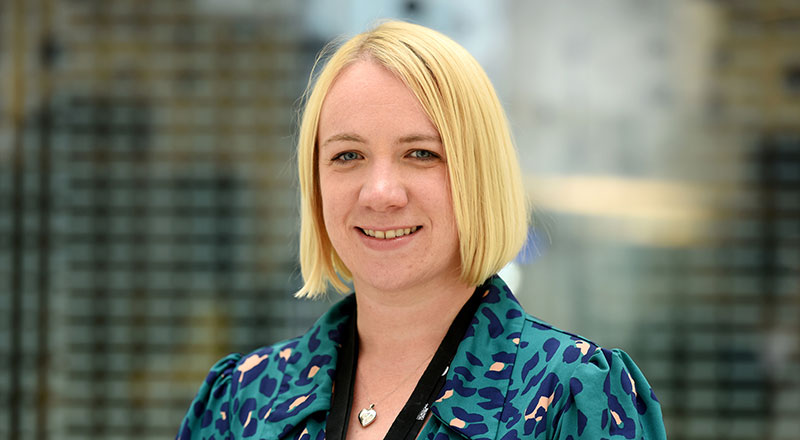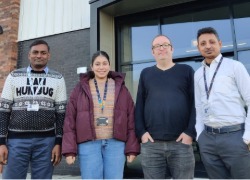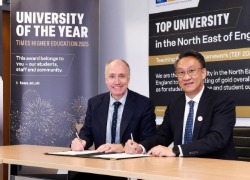Research to help reduce preterm births among academic's diverse projects
Although invisible to the naked eye, microbes play a vital role which can impact on almost every part of our everyday lives. Teesside University academic Dr Caroline Orr is among researchers who use those microscopic organisms in amazing ways.

From research which could ultimately reduce the number of preterm births to improving access to a renewable energy source to power households, Dr Orr’s findings in relation to micro-organisms are being used in a range of extremely diverse projects.
School of Health & Life Sciences academic Dr Orr is one of a number of researchers working from the University’s recently opened £22.3m National Horizons Centre in Darlington, an international centre of excellence for the bioscience industry.
She said: 'My research involves identifying micro-organisms in a sample, whether it is a sample of placenta from a pregnancy, or a solid piece of sewage waste. Those micro-organisms may not be visible, but they are vitally important to virtually every aspect of our lives.'
Once identified within the sample, different micro-organisms can be used in many ways, from the creation of lifesaving medication, to the manufacture of biofuels, to cleaning pollution, or in some food and drink production processes.
One of Dr Orr’s recent research projects, working with Newcastle’s Royal Victoria Infirmary and research colleagues at Northumbria University, will have real world impact in helping to reduce preterm births.
Dr Orr said: 'We have been looking at very early preterm births, examining the presence of bacteria in the placenta. The research involved looking for microbes linked to histological chorioamnionitis which causes inflammation of the placenta and is a leading cause of preterm birth.'
This research is helping to underpin knowledge of the role of micro-organisms within diseases associated with pregnancy and early life, consider treatments and discover new medical diagnostics to highlight disease in advance of onset of symptoms.
Dr Orr explained: 'The next thing is to look at how these micro-organisms can be detected at low level as we are unable to access the placenta during pregnancy, so if they are detected, those at risk can be diagnosed. The impact of this research could lead to lower incidences of preterm birth.'
Projects which Dr Orr is involved in can be poles apart, with other recent research involving waste sewage which is used to create a renewable energy source. The THYME (Teesside, Hull and York - Mobilising Bioeconomy Knowledge Exchange) project is with Northumbrian Water and the University of York.
The National Horizons Centre, which is a fantastic space with world-class facilities, is enabling us to explore and develop research opportunities while involving students in our work
Dr Orr said: 'Northumbrian Water uses advanced anaerobic digesters as part of the process to clean sewage water, resulting in solid waste. The waste contains lots of micro-organisms which break the waste down and create methane, which can be used to create a renewable energy source.
'We are looking at the digesters and examining the micro communities within the waste to look at how the methane is created to help with productivity and efficiency.'
Dr Orr has been invited with other members of the project team to talk about this work in London at the prestigious Royal Society Summer Science Exhibition 2020. This week-long festival in July celebrates the cutting edge of UK science.
She said: 'My work is so diverse and it is a very exciting area, as micro-organisms impact on so many parts of our lives. I am also able to use my research to inform my teaching, helping to ensure students remain up-to-date on the latest methods, techniques and findings.'
Dr Orr, who went from a research role to teaching when she joined Teesside University as an academic eight years ago, added: 'The ways microbes are studied continues to evolve and develop, and techniques have changed so much since I was a student and embarking on my own research career. I really enjoy being able to combine my role as researcher with teaching.
'The National Horizons Centre, which is a fantastic space with world-class facilities, is enabling us to explore and develop research opportunities while involving students in our work. It is enabling us to bring the classroom into the lab, which helps to increase students’ aspirations and enables them see how they can develop. We are seeing more students progressing to PhD study and pursuing research careers.'
During her time at Teesside University Dr Orr has also been involved in research to investigate how microbiological changes can impact on the preservation of artefacts within archaeological sites, as well as investigating how the application of biochar to soil can impact on crop growth.
In the News
Research to help reduce preterm births among academic's diverse projects
North East Chamber of Commerce
Although invisible to the naked eye, microbes play a vital role which can impact on almost every part of our everyday lives. Teesside University academic Dr Caroline Orr is among researchers...
 Groundbreaking project to unlock nuclear energy's role in
...
Groundbreaking project to unlock nuclear energy's role in
... Start the new year by expanding your knowledge
Start the new year by expanding your knowledge  Teesside University strengthens long-standing partnership
...
Teesside University strengthens long-standing partnership
...